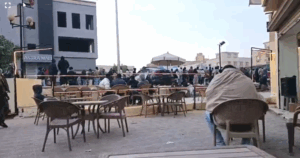Sudan’s El Burhan meets Unamid head to discuss Darfur
The Chairman of Sudan’s Sovereign Council, Lt Gen Abdelfattah El Burhan, and the head of the United Nations – African Union Hybrid Operation in Darfur (Unamid) Jeremiah Mamabolo, held a meeting on Monday to discuss the situation in Darfur.
 The Chairman of Sudan’s Sovereign Council, Lt Gen Abdelfattah El Burhan, and the head of the United Jeremiah Mamabolo observe Covid-19 social distancing precautions at their meeting in Khartoum yesterday (SUNA)
The Chairman of Sudan’s Sovereign Council, Lt Gen Abdelfattah El Burhan, and the head of the United Jeremiah Mamabolo observe Covid-19 social distancing precautions at their meeting in Khartoum yesterday (SUNA)
The Chairman of Sudan’s Sovereign Council, Lt Gen Abdelfattah El Burhan, and the head of the United Nations – African Union Hybrid Operation in Darfur (Unamid) Jeremiah Mamabolo, held a meeting on Monday to discuss the situation in Darfur.
They also addressed the preparations for the approaching meeting of the African Peace and Security Council in light of the upcoming session of the United Nations Security Council in New York regarding the future of the Unamid mission in Darfur.
During the meeting, El Burhan reiterated the position of Sudan regarding the mandate of the proposed UN Peace mission to replace the current Unamid mission. On February 9, PM Hamdok asked the United Nations Security Council to establish a Special Political Mission/Peace Support Operation to assist in the peace process and help Sudan to mobilise international financial assistance. The proposed mission was requested under Chapter VI of the United Nations Charter, which stipulates that the international assistance aims to support the maintenance, monitoring, and building of peace, but not the use of force to prevent violent conflict as it is the case of Chapter VII.
In a press statement, Mamabolo, described his meeting with El Burhan as important because it has coincided with the ongoing intensive discussions within the African Union and the United Nations regarding the upcoming decision regarding the future of Unamid. The upcoming UNSC meeting is expected to discuss the proposed UN peace mission under Chapter VI.
The meeting also elaborated on a number of issues related to the current and proposed missions concerning the security situation in the region. Mamabolo further said the meeting discussed the role of Unamid in the ongoing peace talks in Juba, the capital of South Sudan.
DBA: Unamid exit ‘unwise’
The Darfur Bar Association (DBA) argued that the exit of Unamid under the current circumstances where the security situation has been deteriorating since the end of 2019 is unwise. In the statement on Tuesday, they explained that the proposed UN Peace mission under Chapter VI is impractical, particularly in Darfur.
In the statement, they said that they bear in mind the recent violent events since the beginning of this year starting in Kerending Camp in West Darfur’s El Geneina where hundreds of people were killed and over 45.000 displaced. The intercommunal conflict between Nuba and Beni Amer tribes in Kassala, which claimed dozens of lives. The recent tribal conflict between Rizeigat and Fallata in South Darfur and the tribal tension in South Kordofan.
They said for these reasons, they think that the situation in Sudan requires a UN mission with strong mandate such as the one under Chapter VII for the protection of the people. In the statement, they explained that they understand and appreciate the objectives of the proposed mission, but it will not protect the people.
‘Unamid Presence is desperately needed’
“Unamid is needed now more than ever. The absence of Unamid will deteriorate and bring chaos to the security and humanitarian situation in Darfur, ultimately costing human lives and significant amounts of money,” says Conflict Analysis and Resolution Scholar Practitioner, Dr Adeeb Yousif, in an op-ed published by Radio Dabanga today.
“Darfuris, particularly IDPs and the urban population, are feeling very worried about the news that Unamid is leaving Darfur amid increased attacks against civilians. Their fears stem from the recent past of the Janjaweed militia killing their families, burning their villages, and looting their properties, among other hostilities committed in the absence of the international community. Their fears are also based on analysis of the current political situation. The IDPs, ordinary citizens, and other Unamid beneficiaries all feel the same – that there has not been any significant change in Darfur-Sudan. The people live in fear,” Dr Yousif asserts.
Radio Dabanga’s editorial independence means that we can continue to provide factual updates about political developments to Sudanese and international actors, educate people about how to avoid outbreaks of infectious diseases, and provide a window to the world for those in all corners of Sudan. Support Radio Dabanga for as little as €2.50, the equivalent of a cup of coffee.












 and then
and then